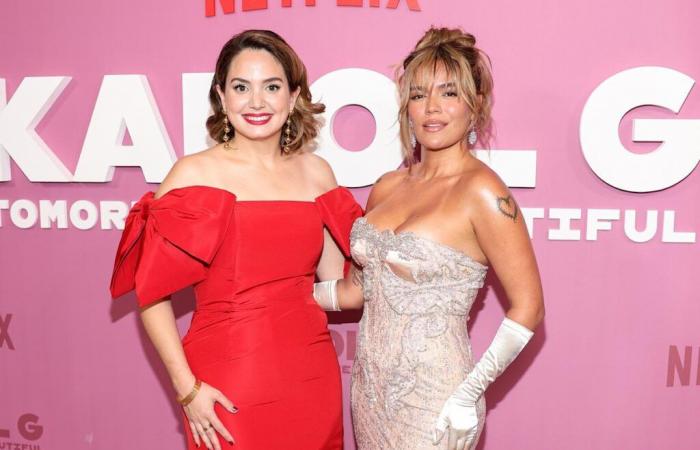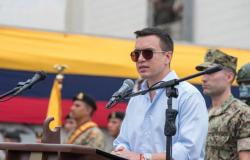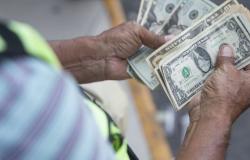
The eye-opening documentary about Colombian superstar Karol G, Tomorrow Was Beautiful (on Netflix now), can be summed up in one poignant moment that showcases the complicated dichotomy of fame.
“I remember one particular concert at MetLife Stadium,” said the film’s director Cristina Costantini of a surreal scene that unfolded before both her eyes and lens. “She looked like she was living her best life on stage, performing for 90,000 people. This should be the best day of her life. But when she gets offstage, she cries for like an hour. And that kind of whiplash, of the public Karol and the private Karol, was really fascinating to me, and a real privilege of being able to witness.”
More from Billboard
The documentary was filmed in the wake of Tomorrow will be prettyher boundary-breaking fourth studio album which became the first Spanish-language album from a woman to debut at No. 1 on the Billboard 200. during the barrier-bashing tour that followed (where that aforementioned scene occurred), the documentary peels back the curtain on the private life, creative process and fame that turned the former teenage Colombian X Factor contestant into a giant of reggaeton and an icon of her homeland.
When Costantini spoke to Billboardshe was fresh off a plane from attending the film’s world premiere in Medellín, the Colombian metropolis in a mountainous province where Karol was born and raised.
“It was surreal and I think it’s a once in a lifetime thing for a filmmaker to see 3,000 people all come together in great spirits to watch a documentary,” she says, noting she was among everyone from Karol’s childhood friends to music teachers who all showed up to support the global superstar. “It was a very lovely, very special and a very pink event.”
Costantini’s road to getting a front-row seat with a camera in hand during an auspicious time in Karol’s life has its roots in her directing a slate of acclaimed documentaries. Her Emmy-nominated Science Fair turned heads in 2018, and Much love: The Legend of Walter Mercadoa 2020 portrait of the famed Puerto Rican astrologer, garnered equal acclaim.
“Two years ago I got a call that Karol was interested in making a movie about both her tour and her life and would I be interested,” Costantini remembers. “So I said ‘Yeah, let me talk to my husband first, who is not Latin.’” The problem is, her husband hadn’t heard of the star, so Costantini, who had recently given birth, had him speak to their nanny, Jasmine, to get her perspective.
“Jasmine said to him, ‘Oh my God, if Cristina doesn’t do this movie, I’ll die. My hair is red right now because of Karol.’ She started crying and talked about how Karol meant everything to her and how her music got her through a hard relationship. So he said, ‘Um, okay. I think you have to do this movie.’”
While Karol was no doubt popular at the time, she hadn’t turned into the indomitable global superstar who transcended borders just yet.
“I mean, I’m Latina and I listen to reggaeton, so I’ve been following Karol since she released ‘Tusa’ [her 2019 collab with Nicki Minaj],” notes Costantini. “But what made it interesting to me is that she wasn’t as well known in the Anglo community then, so it felt like a really interesting time to jump on board.”
Costantini and her crew shot 50 days in total with the promise that Karol wasn’t interested in a fluff piece, but rather a warts-and-all mediation on modern celebrity. “At first we had a much bigger footprint, with a lot of gear and people. But she wasn’t quite being herself, so we shrunk it down to these cameras you’d normally not shoot on because we had a sense we’d get way more footage and access, and that wound up being the case.”
“For the last two and a half years, I’ve had cameras around me like I was living in a reality show, trying to ignore, overlook or avoid them,” Karol G told Billboard‘s Isabela Raygoza on the red carpet for the film’s premiere in New York. “It was hard — sometimes I did feel a little frustrated, like I was being watched too much. There were plenty of times when I’d ask for a bit more privacy, to be a little more alone, to spend more time with my family and friends.”
Eventually, she came to trust the process; the end result is Karol splayed on a couch, pouring her heart out into the lens. “This is basically like a mini reality show squeezed into an hour and 48 minutes,” she cracked.
-The result are raw scenes where the superstar ruminates on the pros and cons of fame. “Everyone could see I was at the top of my career,” she says at one point in the film in her native Spanish. “But inside, I felt like I was losing who I really was. As much as I’d like to explain how difficult it was, I wouldn’t have enough time.”
“I have so much respect for her ability to really go there and put herself out like she has,” Costantini explains of the superstar’s vulnerability. At one point in the film, Karol talks about being sexually harassed when she was 16 by a former manager, leading her to take a pause from her dreams of pursuing music and move to New York.
Costantini said she didn’t need much prompting to mine her darkest memories. “Like the story about her [former] manager, she’s never gone there before, but we had talked about that and she was clearly very ready to go there,” the director says. “It takes an immense amount of trust and faith to be as vulnerable as Karol has been.”
“I can assure you that no woman who respects herself would allow being harmed in order to achieve something,” an emotional Karol said.
She also touched on her relationship with the Puerto Rican rapper Anuel AA, with whom she collaborated on the songs “Follow” and “Secreto.” The two, who met on the set of their collab “Culpables,” became engaged in 2019 before calling it quits in 2021. In the film, she calls the whirlwind love affair and brutal breakup “a nightmare” and “hell,” admitting she “felt worthless as a person.” In its wake, she also is honest about her more positive times with her boyfriend, the Colombian star Feid.
Costantini also had her camera on moments where Karol’s tenacity shines, including a day when she went through a grueling eight hours of tour rehearsals with the famed choreographer Parris Goebel (who most recently was the architect of Lady Gaga’s Coachella set), during the same period she swam in New York’s East River.
The dip in the water “didn’t mean much to Colombians; I don’t think they understood what the East River was,” Costantini says of the notoriously murky New York waterway. “But the American team was like, ‘I don’t know if we should be doing that.’ And then of course she gets sick, so watching her just press on in the face of all of this was incredible.”
In fact, Karol’s hands-on approach made the biggest impression on Costantini, who noted that the singer is involved with even the most granular details of her career. “We know she writes, sings and dances with that pop star skill set, but she also has this incredible business mind which I’ve seen up close. She just opened two restaurants and a nightclub, and she’s overseeing all of the menus. Meanwhile, when she’s on tour she’s asking questions like, ‘Why do the bracelets at the stadium cost this much if they’re only doing these certain functions.’”
For Costantini, she chalks it all up to her “obsession of being perfect.” She explains: “You see that her success is not a mistake. She’s been working at this for years and years and years and it’s the product of really hard work.”
Naturally, that obsession seeped into the production of the documentary itself. “She can (tell you) ‘this is where the camera should be, this is where the lights should be, this is how I wanna look.’ But she can also be very soft, very sweet and very kind, too.”
So what did the perfectionist think of the Costantini film? “I think there are some parts that are really hard for her to watch or tough for her to stomach,” says Costantini of Karol’s impression following the film’s premiere, while conceding that Karol is “also the kind of person who is onto the next thing: ‘What do we do now, what’s next, how I am going to completely flip the script of what I just did?’
“But in the end, what’s great about a documentary is that it lets you stop and think for a moment. She expressed that idea quite a bit: that it forces her to stop and say, ‘Hey, I did that.’”
Best of Billboard
Sign up for Billboard’s Newsletter. For the latest news, follow us on Facebook, Twitter, and Instagram.





